Table of Contents
Fueling the FIRE: Responses to Richard Hasen on how the government should identify professional journalists for access and protection — First Amendment News 419
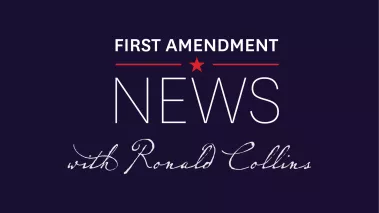
First Amendment News is a weekly blog and newsletter about free expression issues by Ronald K. L. Collins. It is editorially independent from FIRE.
Last week, I posted excerpts from Professor Richard Hasen’s essay on how the government might best identify professional journalists for access to government events, as well as the related protections afforded to journalists. In Part IV of that essay, as I highlighted in those excerpts, Hasen took issue with certain arguments tendered by FIRE in its amicus brief, which was filed in the Ninth Circuit in TGP Communications v. Jack Sellers (FIRE’s Ronnie London, counsel of record).
In the spirit of fairness and the free exchange of ideas, I invited the FIRE folks to reply, which they accepted. And to add a bit more conceptual fuel to the “FIRE,” Stephen Rohde also entered the fray with his own reply to Hasen.
Both are featured below.
The “fiery” exchange will continue next week, when professor Hasen will return with a rejoinder to his critics.
Meanwhile, let the word go out: We’re on fire here at FIRE! And expect more heat (and light too) in the days and months to come.
FIRE’s Response to professor Hasen
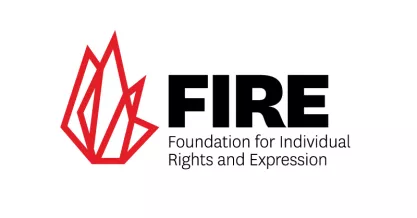
FIRE does not share professor Richard Hasen’s faith in the government’s ability to assess journalistic commitments to objectivity and truth.
Professor Hasen argues the government may “avoid slipping into viewpoint discrimination” by denying press privileges “only” to those who have “no track record of consistently gathering, reporting, and disseminating truthful information” or “a track record of consistently reporting and disseminating empirically verifiable false claims as true [emphases in original].”
Professor Hasen’s restriction may hold some simple appeal. After all, everyone likes “truthful information.” But who would professor Hasen empower to determine exactly what constitutes “truthful information”? Well, the government, of course. And therein lies the rub.
The facts of TGP Communications, LLC v. Sellers (9th Cir., 2022) illustrate how government officials may exploit undefined normative criteria to punish journalists for their views. In our amici curiae brief, FIRE and the Marion B. Brechner First Amendment Project underscore the problem with Maricopa County’s Press Pass Regulation:
The Regulation permits election officials to exclude applicants based on, among other factors, whether the applicant journalist avoids “real or perceived conflicts of interest” and is “free of associations that would compromise journalistic integrity or damage credibility.” This regulation provides no standards whatsoever to determine “integrity” or “credibility.” In reality — and as this Court acknowledged in granting an injunction pending appeal — this requirement is a smokescreen to regulate truth, one that county officials are arbitrarily using to exclude journalists they think are spreading lies based on the county’s own subjective interpretations. Regardless, whether the Press Pass Regulation seeks to require objectivity or to regulate truth, the result is the same: Both constitute unconstitutional viewpoint discrimination.
In its order granting an injunction pending appeal, the U.S. Court of Appeals for the Ninth Circuit voiced the same concerns: “Permitting ‘truth’ to be determined by the County violates our foundational notions of a free press.” And empowering the government to review journalism for adherence to unspecified values will all but inevitably result in viewpoint discrimination. “It is the County’s politically-tinged assessment of Conradson’s prior reporting that appears to have led it to deny him a press pass,” the panel explained. “That type of viewpoint-based discrimination is exactly what the First Amendment protects against.”
FIRE’s skepticism of the government’s ability to enforce journalistic norms is not “nihilism.” Rather, it reflects the First Amendment’s animating concern: distrust of government as the arbiter of truth. Moreover, FIRE’s opposition to empowering the government to assess who has a “track record” of truth-telling did not come from nowhere. Rather, it is based on the hard lessons learned by the Constitution’s framers. As FIRE’s Bob Corn-Revere and Ronnie London, formerly of Davis Wright Tremaine, explained in an amici brief filed to the Supreme Court for the Reporters Committee for Freedom of Expression and 23 news media organizations in support of certiorari in U.S. v. Alvarez (2012):
The earliest lessons of our republic confirmed the government could neither be trusted to protect only “truth” nor empowered to punish “falsity.” The Sedition Act of 1798 made it a crime to “write, print, utter or publish ... any false, scandalous and malicious writing or writings against the government” with the intent to defame Congress or the President. Sedition Act of 1798, 1 Stat. 596. Although the law permitted truth as a defense, it was used aggressively to punish political opponents of the Adams Administration.
The Sedition Act “was less a piece of legislation than an act of vengeance by federalist lawmakers who decided to strike back at the republican newspapers that they felt had been demonizing their intentions and slandering their character for far too long.” Eric Burns, INFAMOUS SCRIBBLERS: THE FOUNDING FATHERS AND THE ROWDY BEGINNINGS OF AMERICAN JOURNALISM 356 (2006). Sedition Act prosecutions were instituted against editors of newspapers in major cities like Philadelphia, New York and Boston, as well as in smaller towns in Connecticut and Vermont. Philip I. Blumberg, REPRESSIVE JURISPRUDENCE IN THE EARLY AMERICAN REPUBLIC 101 (2010). Of the ten people convicted under the Act, seven were journalists, and one other editor was tried but acquitted. Id. See also Burns, supra, at 362. As a result, five republican papers were shuttered or ceased publication for at least some period during this time. Blumberg, supra, at 101.
Many of these prosecutions were prompted by partisan rants, but others were predicated on reports of “false” factual statements. William Duane, editor of the Philadelphia Aurora, was summoned before the Senate to answer Sedition Act charges because he published the details of a leaked draft of a federalist bill that would have effectively superseded the Electoral College, and, unfortunately, “got some of his facts wrong.” Blumberg, supra, at 119-20. Charles Holt, editor of the New London Bee, defended against Sedition Act charges by arguing he had published only opinion protected by the Constitution. He nevertheless was convicted and the Bee ceased publication while Holt was imprisoned. Id. at 113.
After all, the law on its face clearly permitted prosecution of “false statements,” and, as Representative John Allen of Connecticut explained in advocating its passage, the Act was necessary to punish publication of “the most shameless falsehoods against the Representatives of the people of all denominations.” Burns, supra, at 357.
These prosecutions illustrated vividly “how speedily an Act to protect national security at a time when an administration perceives the country to be on the brink of war can be used to suppress freedom of speech.” Blumberg, supra, at 99. The experience prompted certain Framers, including Madison and Jefferson, to articulate a broad theory of freedom of expression to explain the meaning of the First Amendment. Leonard Levy, LEGACY OF SUPPRESSION 258-65 (1960). Such reactions exposed “the frailty of the argument that freedom of political expression implied freedom for ‘truth’ only.” Id. at 263.
The Sedition Act expired by its own terms on the last day of the Adams Administration and was never tested in court, but the consensus of history is that it was fundamentally at odds with the First Amendment. As Thomas Jefferson put it as he pardoned and remitted the fines of those convicted under the law, “I considered ... that law to be a nullity, as absolute and as palpable as if Congress had ordered us to fall down and worship a golden image.” 4 JEFFERSON’S WORKS 555-56 (Washington ed.) (Letter to Abigail Adams, July 22, 1804). This experience with the federal government’s initial effort to criminalize false speech “first crystallized a national awareness of the central meaning of the First Amendment.” New York Times Co. v. Sullivan, 376 U.S. at 273.
As it laid the foundation for modern First Amendment jurisprudence, the Supreme Court made clear that the government cannot be the arbiter of truth.
Related
- Tina Traster, “Town Discriminates Against RCBJ In Effort To Block News Coverage; Legal Cases Support Press’ Right to Access,” Rockland County Business Journal (April 9)
Rohde weighs in: It’s too dangerous to let the government decide who are ‘faux journalists’
What follows is Stephen Rohde’s response to Hasen. — rklc

I've known Rick Hasen to be one of America’s premier attorneys specializing in election law. I’ve also had the privilege of working with him on the knotty question of campaign finance laws. But his latest foray into defining who qualifies as a “journalist” is fraught with several problems which could pose a serious threat to freedom of the press.
Invitation to censorship
While his concerns about who is entitled to “special access” are justified, the multi-part test he proposes to define a “journalist” is far too cramped and uncertain. It invites restrictions on those otherwise entitled to protection under the First Amendment. His suggestion that those who fall outside his definition are therefore “faux journalists” who can be denied access and protection will be welcomed by the likes of former President Donald Trump and the governors of states like Florida and Texas — they would be eager to adopt a narrow framework written by a leading expert to exclude, punish, or censor their critics. That's surely not Hasen’s intent, but it could well be the result.
Vagueness problems and ‘Truth Commissions’
Hasen's proposed definition suffers from considerable vagueness. By what objective standards are we to decide who is a “bona fide” correspondent of “repute”? Are we to leave that up to local, state, and federal government officials? And wouldn't applying such vague standards allow for unfettered discretion in the hands of government officials who are eager to silence investigative journalists?
According to Hasen, legitimate journalists do not report “empirically false” information. But under the U.S. Supreme Court decisions in United States v. Alvarez (2012), and New York Times v. Sullivan (1964), an “empirically false” standard would not pass constitutional muster. And who will sit on the Truth Commission?
Fact-checking requirement?
To qualify according to Hasen, a journalist needs to subject their work to “fact-checking.” What if a hard-working journalist can’t afford to hire a “fact checker”? Or what if they are writing on deadline and believe in good faith their article is accurate? Are they to be labeled “faux”?
To avoid being labeled a “faux journalist,” Hasen requires they offer their subjects a right of reply. To date, the Supreme Court has never considered a right of reply as a prerequisite for First Amendment protection. As a journalist, I’ve written scores of articles (on Trump, John Eastman, et al.) without offering the subjects a right to reply. Am I a “faux journalist”?
Looking back to the Silkwood case
As a lawyer, I litigated the issue of how to define a reporter for First Amendment purposes back in 1977. I was representing one of the filmmakers who produced the film “Silkwood.” In that case, Meryl Streep portrayed whistleblower Karen Silkwood, who died in a suspicious 1974 automobile accident in Oklahoma. Her family sued the Kerr-McGee Corporation alleging it was complicit in her death.
Kerr-McGee got wind of the fact that my client, Buzz Hirsch, was working on a movie about Silkwood, and they subpoenaed him to give a deposition. Hirsch had promised his sources confidentiality. We sought to quash the subpoena because, under the First Amendment, Hirsch was protected by the so-called “newsman’s privilege.” The Tenth Circuit Court of Appeals agreed with us, reversed the lower court, and remanded the case to see if Kerr-McGee could overcome Hirsch's qualified privilege. Instead, Kerr-McGee abandoned the effort to depose Hirsch.
The Tenth Circuit’s analysis supports my view that Hasen's proposed definition is far too narrow.
The District Court held “that Hirsch was not entitled to be considered a newsman because he did not regularly engage in obtaining, writing, reviewing, editing or otherwise preparing news.” The Tenth Circuit disagreed, saying:
We must consider, first, the question of the effect on the validity of the privilege where the reporter is not a regular newsman. Does this limit the scope and extent of the constitutional privilege? Our conclusion is that, under these facts at least, it does not. True, Hirsch is shown here to be a filmmaker rather than a newspaperman, although he has been in the past a freelance writer for newspapers. His mission in this case was to carry out investigative reporting for use in the preparation of a documentary film. He is shown to have spent considerable time and effort in obtaining facts and information about the subject matter in this lawsuit, but it cannot be disputed that his intention, at least, was to make use of this in preparation for the film. It strikes us as somewhat anomalous that the appellee would argue that he is not a genuine reporter entitled to the privilege, implying a lack of ability, while at the same time they are making a major legal effort to get hold of his material. They must believe that it has promise for them in this lawsuit; otherwise, they would not be engaging in an effort of some magnitude in order to obtain Hirsch's work product.
The Tenth Circuit noted that the Supreme Court has not limited the privilege to newspaper reporting.” It continued:
It has held that the press comprehends different kinds of publications which communicate to the public information and opinion. Lovell v. City of Griffin (1938), and other cases recognize the presence of an underlying public interest in this communication and particularly in maintaining it free in the public interest.” Accordingly, the court concluded that “we are not prepared to say that the fact that Hirsch is not a salaried newspaper reporter of itself acts to deprive him of the right to seek protective relief.
Conclusion
In the end, Richard Hasen agrees that any doubt over whether someone is a journalist should be resolved in their favor. At a time when press freedom is under assault, let's not facilitate further restrictions by endorsing a constricted definition of journalism. Instead, when it comes to articulating the scope of freedom of the press under the First Amendment, a robust approach furthers the free exchange of information.
Related
- Stephen F. Rohde, “Real to Reel: The Hirsch Case and First Amendment Protection for Film-makers’ Confidential Sources of Information,” Pepperdine Law Review (1978)
First Amendment Watch interview with Jacob Mchangama on AI and the First Amendment
Susanna Granieri, “Vanderbilt’s Jacob Mchangama on the First Amendment Implications of Generative AI,” First Amendment Watch (April 9)

The rise of generative artificial intelligence has led to questions about its First Amendment implications — like its use by journalists or its application in defamation law — but it remains unclear how the nation’s courts will consider its potential impacts on the marketplace of ideas.
The technology itself does not have rights, but humans utilize technology — like radio, television and the internet — for their own expression.
The Foundation for Individual Rights and Expression has stated that because of these prior applications of First Amendment protection, that “the use of artificial intelligence to create, disseminate, and receive information should be protected.”
“Any government restriction on the expressive use of AI needs to be narrowly tailored to serve a compelling governmental purpose, and the regulation must restrict as little expression as is necessary to achieve that purpose,” FIRE wrote.
First Amendment Watch spoke with Jacob Mchangama, the founder and executive director of The Future of Free Speech at Vanderbilt University, about artificial intelligence and his latest piece in TIME magazine, “The Future of Censorship Is AI-Generated.” Mchangama discussed how defamation cases may arise from generative AI, his concerns over government involvement in censoring certain AI-generated content, and the importance of skepticism when using AI and evaluating its capabilities.
Testing the loopholes in campaign finance laws
- Jessica Piper, “Super PACs keep testing the limits of campaign finance law,” Politico (April 8)
Super PACs keep pushing the boundaries of campaign finance law this cycle.
They’re using novel financial arrangements, like taking “bridge funding” in the form of undisclosed de facto loans from major donors or receiving ad revenue from a candidate’s podcast. They’re also continuing to take advantage of long standing loopholes in anti-coordination guidelines.
The willingness to push the boundaries suggests that U.S. politics has entered the Wild West campaign financing system that many observers predicted would come in the wake of the court’s weakening campaign finance laws.
It comes as super PACs are taking a more prominent role in campaigning. Total spending on independent expenditures so far this cycle is nearly 2.5 times what it was at this point in 2020. And because candidates are having more and more trouble with small-dollar fundraising, super PAC money could be even more important as the cycle continues.
Penn Free Speech Alliance launches
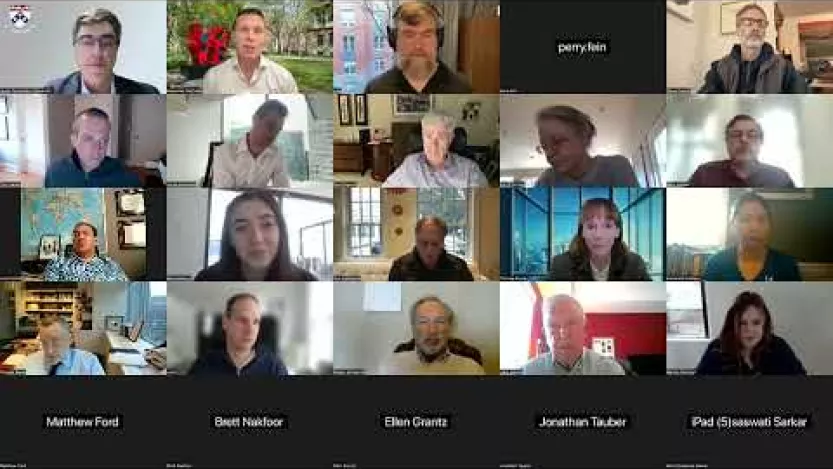
New book on hate speech
- Cary Nelson, “Hate Speech and Academic Freedom: The Antisemitic Assault on Basic Principles” (Academic Studies Press, April)
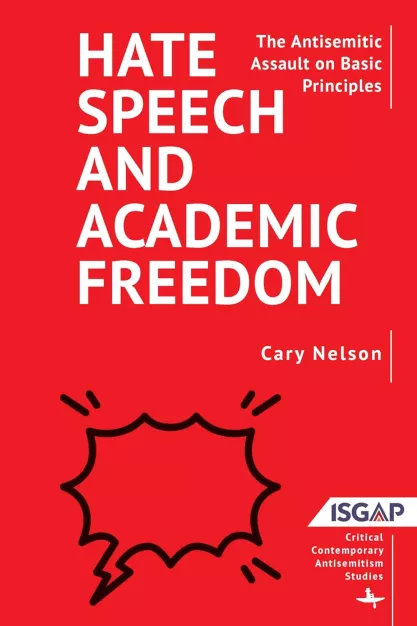
Completed shortly before Hamas carried out its barbaric October massacre, Hate Speech and Academic Freedom takes up issues that have consequently gained new urgency in the academy worldwide. It is the first book to ask what impact antisemitism has had on the fundamental principles the academy relies on for its identity — academic freedom, free speech rights, standards for hiring or firing faculty members and administrators, and the ethics of academic conduct and debate.
Antisemitic hatred is spreading at a fever pitch. What steps can counter it? What damage to students is done when departments embrace anti-Zionism? Should faculty members face consequences for promoting antisemitism on social media? Should universities make a new push to adopt the IHRA Definition of Antisemitism?
Related
- “Chemerinsky: ‘I am a 70-year-old Jewish man, but never in my life have I seen or felt the antisemitism of the last few weeks’,” FAN 400 (Nov. 8, 2023)
Norton on reinvigorating the Press Clause
- Helen L. Norton, “Reinvigorating the Press Clause Through Negative Theory,” Social Science Research Network (Feb. 28)
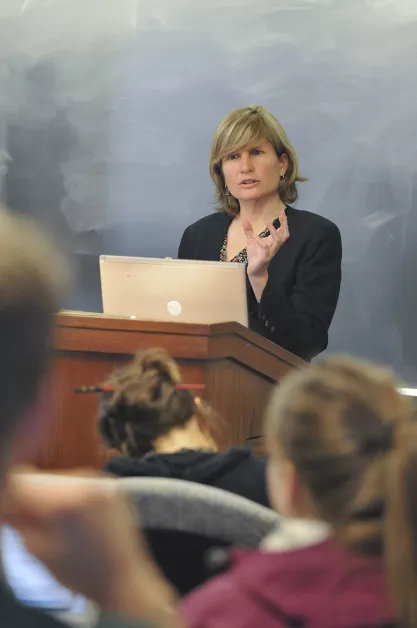
What work could an independent Press Clause do apart from the work already done by the Speech Clause? This question requires us to think about why and how the press is different from other speakers for First Amendment purposes — more specifically, what distinct functions does the press perform and what distinct vulnerabilities does the press possess?
In terms of distinct press functions, the press serves the public through its watchdog, educator, and proxy roles. These functions, in turn, explain the press’s distinct vulnerabilities to government retaliation: because the press’s primary purpose is to scrutinize the government for the public’s benefit, the government has long perceived the press as inherently threatening to its political self-interest. Moreover, changes in the technological and political environment have aggravated threats to journalists’ physical safety, intensifying their vulnerability still further. Rooted in distrust of the government’s self-interested efforts to punish and thus silence the press, “negative” First Amendment theory has long offered an important tool for understanding the Press Clause. And negative theory is now more valuable an interpretive tool than ever, as press organizations and individual journalists are increasingly vulnerable to the government’s retaliation.
Among other things, negative theory can help us understand the Press Clause as providing an especially robust shield from the government’s retaliation — a shield different from that offered the public more generally by the Speech Clause precisely because of the press’s distinct functions and vulnerabilities. More specifically, directing judicial attention to the reasons to distrust the government’s adverse treatment of the press can reinvigorate Press Clause doctrine by informing courts’ choices of legal rules and by informing their application of those rules once chosen.
Trump (First Amendment) news
- Brianna Herlihy, “Trump makes another appeal to Georgia court to dismiss charges on First Amendment grounds,” Fox News (April 8)
- Josh Gerstein, “Jack Smith: False elector scheme saves Trump obstruction charges,” Politico (April 8)
- Antonio Fins, “Donald Trump says he would go to jail for free speech rights but stops short of gag order,” USA Today (April 7)
- Olivia Rubin, “Judge denies Trump's motion to have Georgia election case dismissed on 1st Amendment grounds,” ABC News (April 4)
- “Judge Expands Trump’s Gag Order After His Social Media Posts About Judge’s Daughter,” First Amendment Watch (April 2)
More in the news
- Eugene Volokh, “Pennsylvania Trial Court Rejects Pseudonymity in Defamation Suit Over Sexual Assault Allegations,” The Volokh Conspiracy (April 9)
- Chad de Guzman, “What to Know About Elon Musk’s Battle With a Brazilian Judge Over Speech on Social Media,” Time (April 9)
- Eugene Volokh, “Louis Farrakhan Loses Lawsuit Against Anti-Defamation League,” The Volokh Conspiracy (April 9)
- Joanna Putman, “Fla. city implements policy limiting ‘First Amendment auditors’ in PD station lobby,” Police 1 (April 9)
- Harry Boesche, “U.S. Supreme Court Changes Law on Government First Amendment Liability for Social Media Activities,” Municipal Research and Services Center (April 8)
- Teiko Foxx, “First Amendment rights group FIRE concerned about Governor Landry’s push for colleges to require student-athletes be present for national anthem,” Louisiana Radio Network (April 8)
2023-2024 SCOTUS term: Free expression and related cases
Cases Decided
- McKesson v. Doe (Per Curiam: 7-1 with Thomas, J., dissenting: “[W]e conclude that the Fifth Circuit should not have ventured into so uncertain an area of tort law — one laden with value judgments and fraught with implications for First Amendment rights — without first seeking guidance on potentially controlling Louisiana law from the Louisiana Supreme Court. We express no opinion on the propriety of the Fifth Circuit certifying or resolving on its own any other issues of state law that the parties may raise on remand. We therefore grant the petition for writ of certiorari, vacate the judgment of the United States Court of Appeals for the Fifth Circuit, and remand the case to that court for further proceedings consistent with this opinion.”)
Review granted
- Vidal v. Elster (argued Nov. 1)
- O’Connor-Ratcliff v. Garnier (argued Oct. 31)
- Moody v. NetChoice, LLC and NetChoice, LLC v. Paxton (argued: Feb. 26, 2024)
- National Rifle Association of America v. Vullo (argument: March 18, 2024)
- Murthy v Missouri (argument: March 18, 2024)
- Speech First, Inc. v. Sands (certiorari granted, judgment re the bias policy claims vacated, and case remanded to the Court of Appeals for the 4th Circuit with instructions to dismiss those claims as moot) (Thomas and Alito, dissenting)
- Gonzalez v. Trevino (argued March 20, 2024)
Pending petitions
- No on E, San Franciscans Opposing the Affordable Care Housing Production Act, et al. v. Chiu
- Mckesson v. Doe
- Pierre v. Attorney Grievance Commission of Maryland
- O’Handley v. Weber
State action
- Lindke v. Freed (Barrett, J., 9-0: “The state-action doctrine requires Lindke to show that Freed (1) had actual authority to speak on behalf of the State on a particular matter, and (2) purported to exercise that authority in the relevant posts. To the extent that this test differs from the one applied by the Sixth Circuit, we vacate its judgment and remand the case for further proceedings consistent with this opinion.”)
- O’Connor-Ratcliff v. Garnier (Per Curiam: 9-0: “We granted certiorari in this case and in Lindke v. Freed (2024), to resolve a Circuit split about how to identify state action in the context of public officials using social media. Because the approach that the Ninth Circuit applied is different from the one we have elaborated in Lindke, we vacate the judgment below and remand the case to the Ninth Circuit for further proceedings consistent with our opinion in that case.”)
Review denied
- Brokamp v. James
- Griffin v. HM Florida-ORL (application for stay denied)
- M. C. v. Indiana Department of Child Services
- Spectrum et al v. Wendler
- Porter v. Martinez
- Molina v. Book
- Porter v. Board of Trustees of North Carolina State University
- NetChoice, LLC v. Moody
- Alaska v. Alaska State Employees Association
- X Corp. v. Garland
- Tingley v. Ferguson (Justice Kavanaugh would grant the petition for a writ of certiorari. Justice Thomas, dissenting from the denial of certiorari. (separate opinion) Justice Alito, dissenting from the denial of certiorari. (separate opinion))
- Jarrett v. Service Employees International Union Local 503, et al
- Sharpe v. Winterville Police Dept.
- Winterville Police Department v. Sharpe
- Stein v. People for the Ethical Treatment of Animals, Inc., et al.
- Blankenship v. NBCUniversal, LLC
- Center for Medical Progress v. National Abortion Federation
- Frese v. Formella
- Mazo v. Way
Free speech related
- Miller v. United States (pending) (statutory interpretation of 18 U.S.C. § 1512(c) advocacy, lobbying and protest in connection with congressional proceedings) // See also Fischer v. United States (to be argued April 16)
Previous regularly scheduled FAN
FAN 418: “Hasen on how the government should identify professional journalists for access and protection”
This article is part of First Amendment News, an editorially independent publication edited by Ronald K. L. Collins and hosted by FIRE as part of our mission to educate the public about First Amendment issues. The opinions expressed are those of the article’s author(s) and may not reflect the opinions of FIRE or Mr. Collins.
Recent Articles
Get the latest free speech news and analysis from FIRE.

VICTORY: Court vindicates professor investigated for parodying university’s ‘land acknowledgment’ on syllabus

Can the government ban controversial public holiday displays?

DOJ plan to target ‘domestic terrorists’ risks chilling speech


